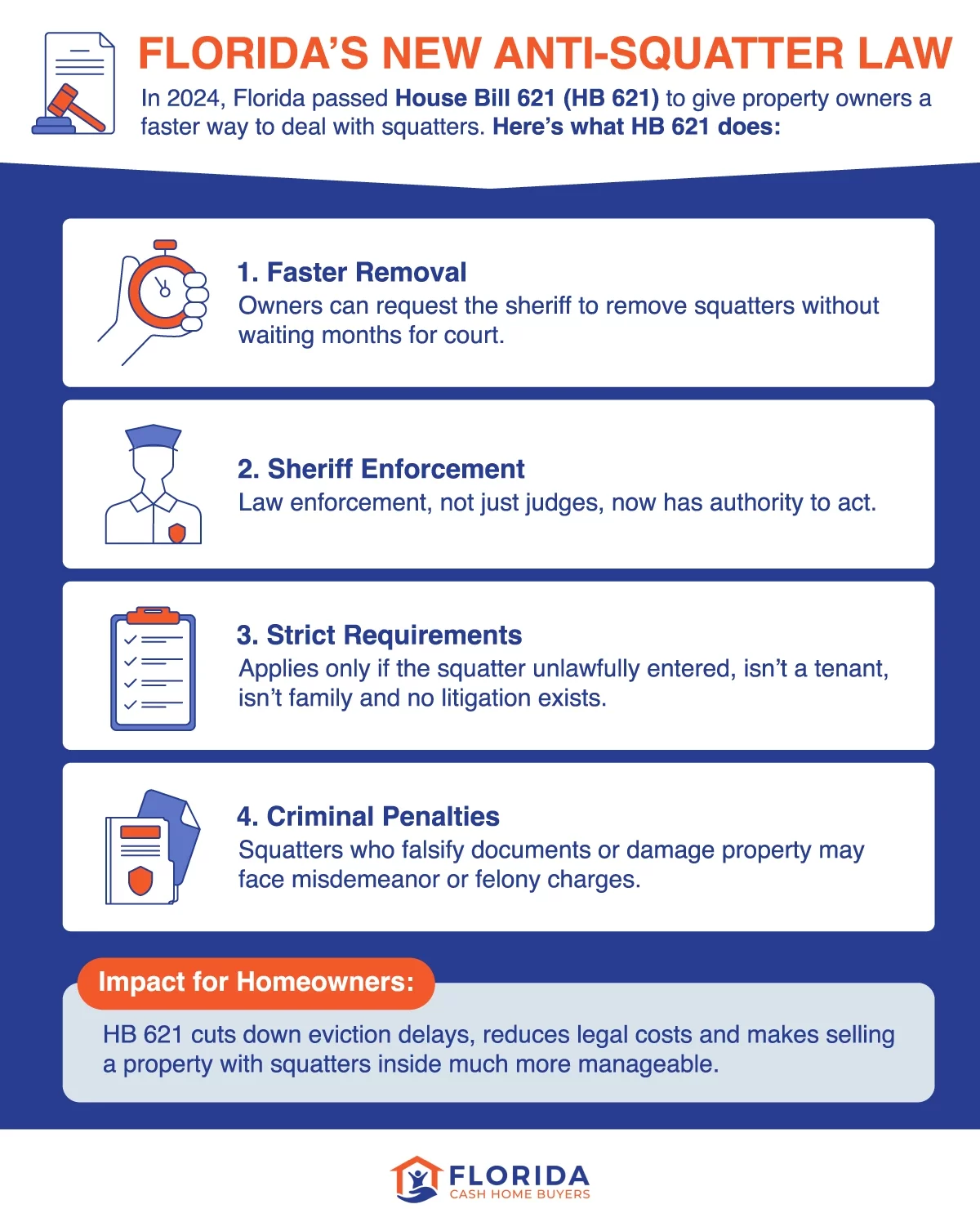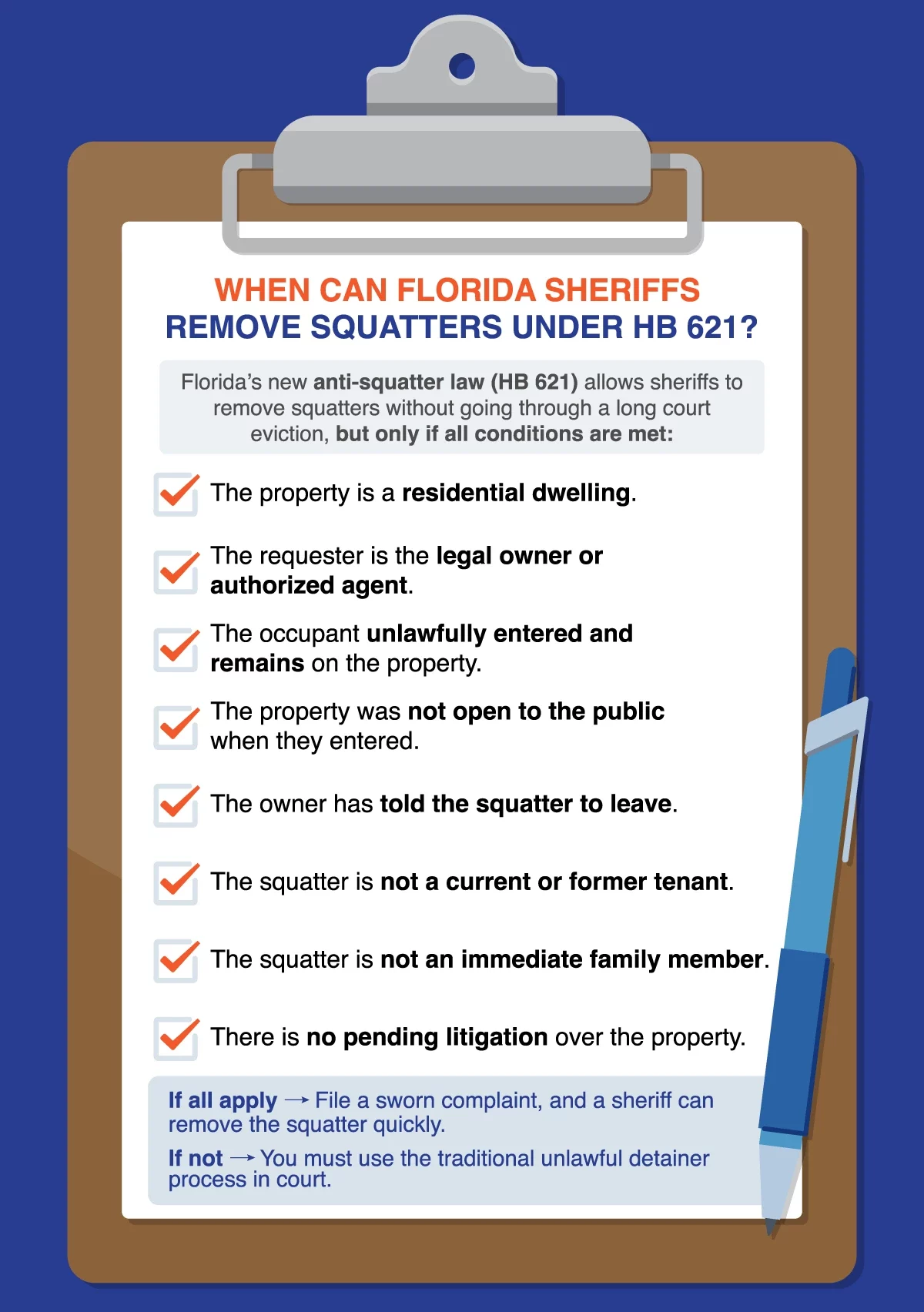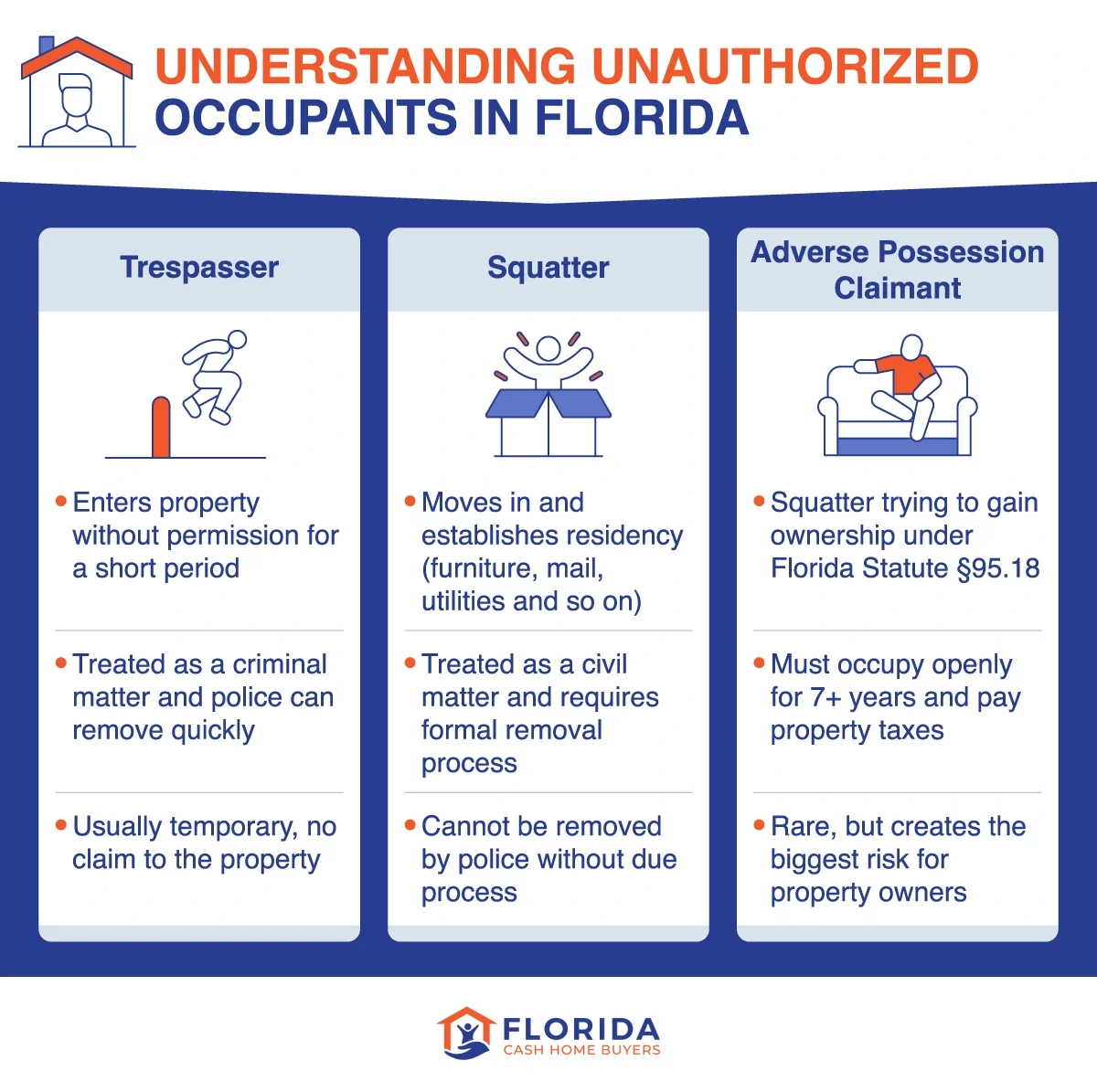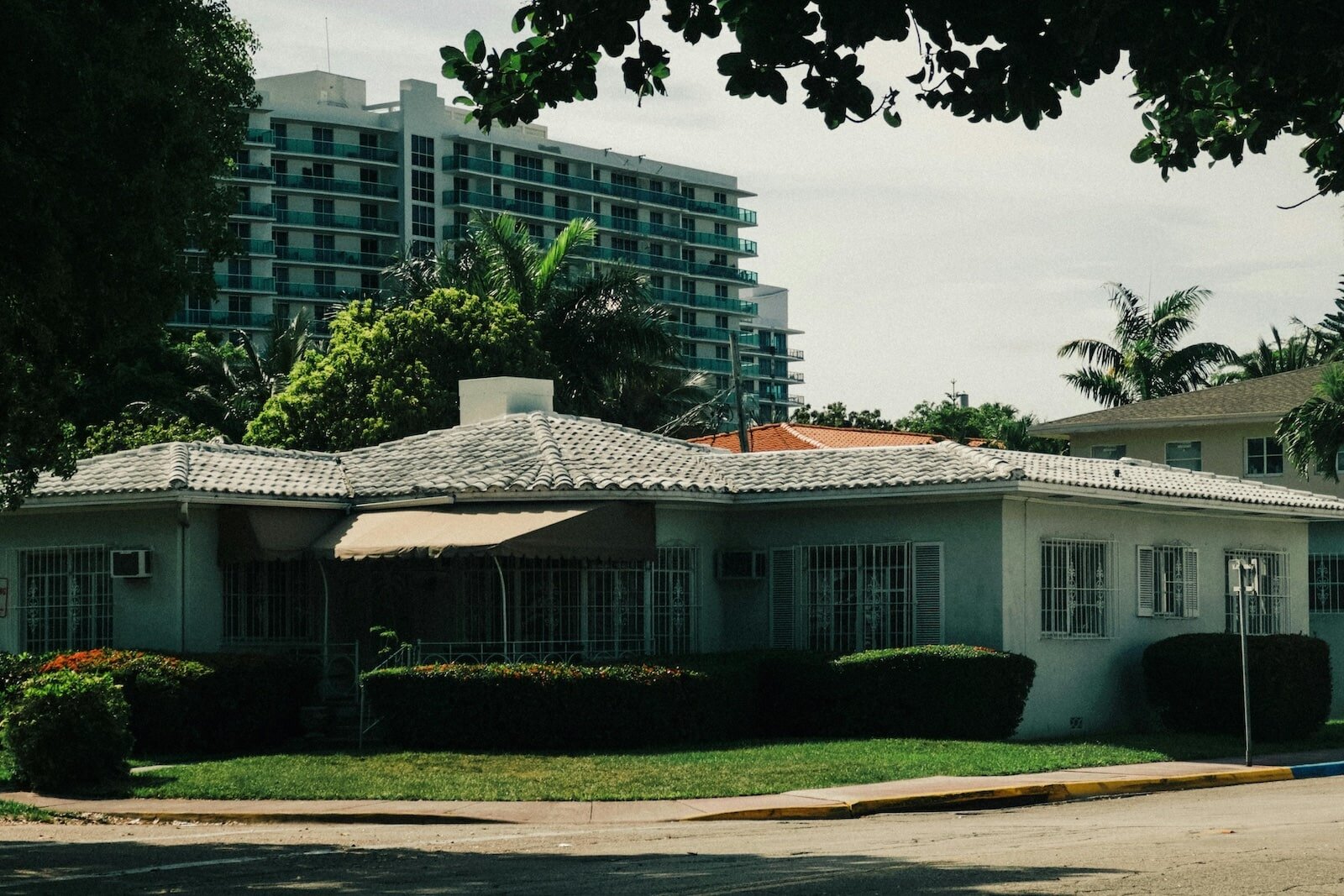Finding squatters in your Florida property isn’t just inconvenient, it can trigger serious legal and financial challenges. Unauthorized occupants may damage the home, disrupt your ability to sell and even attempt to claim property rights under Florida’s adverse possession laws. Understandably, many homeowners wonder if they can sell their house with squatters still inside. The answer is yes, but the process depends heavily on state laws and the type of buyer you work with.
Traditional buyers usually avoid homes with squatters due to financing and legal issues, but that doesn’t mean you’re stuck. Florida Cash Home Buyers specializes in purchasing houses in difficult situations, including those occupied by squatters. We handle the legal and logistical headaches so you can sell your property quickly, safely and without unnecessary stress.
Can I Sell a House with a Squatter in Florida?
Yes, Florida law allows you to sell a home or multifamily property even if squatters are inside, but their presence creates significant hurdles. A squatter in Florida is someone occupying a property without the owner’s permission. While they do not gain ownership of the property simply by moving in, they do have possession until they are removed through a lawful eviction. This distinction matters: Possession gives them temporary rights to remain in the property, which complicates a sale because buyers and lenders cannot simply disregard those rights.
The problems usually fall into three categories:
- Legal rights: Before 2024, squatters could only be removed after a court-ordered eviction, often taking months. With the new HB 621 law, law enforcement can step in sooner if the owner proves there’s no lease or ownership claim. But until removal happens, the squatters remain in place, and a new buyer inherits the risk of delays, property damage or even an adverse possession claim.
- Disclosure obligations: Florida sellers must disclose material facts that affect the property, including unauthorized occupants, which can deter many buyers.
- Financing barriers: Mortgage lenders typically won’t approve loans for homes with squatters, making traditional sales much more challenging.
This typically leaves homeowners with two practical routes:
- Pursue eviction first, then sell at market value once the property is vacant.
- Sell directly to a cash buyer like Florida Cash Home Buyers, who can purchase “as-is” and take on the legal challenges themselves.
How to Sell a Property in Florida with Squatters Inside
If squatters are occupying your home, you still have options. The right approach depends on your timeline, finances and tolerance for risk. Here’s a clear framework to guide your decision:
1. Document Occupancy
Take photos, keep records of mail or belongings and file a police report if appropriate. This evidence helps in court or when disclosing to buyers.
2. Consult a Professional
Speak with a real estate attorney, property management company or eviction specialist to understand your legal position.
3. Decide Your Path
You can either remove squatters before selling or sell as-is with them still inside.
|
Homeowner Options for Selling a Florida Property with Squatters
|
||||
|---|---|---|---|---|
| Selling Option | Speed of Sale | Costs | Risks & Challenges | Best For |
| Evict, then list traditionally | Slow: Can take several months | Legal fees + holding costs, ongoing mortgage, taxes, insurance, and utilities | High: Eviction delays; possible property damage; buyer hesitancy | Owners who want top dollar and don’t mind waiting |
| Sell to cash buyer | Quick: 15 to 30 days | Cash buyer covers legal + closing costs | Low: Cash buyer handles eviction; legal process; and repairs | Owners who want speed, certainty and no extra stress |
For many homeowners, selling directly to a cash buyer is the most practical. Companies like Florida Cash Home Buyers specialize in distressed and occupied properties. They don’t require inspections, appraisals or repairs, and they take responsibility for the legal steps of removing squatters after closing. This allows you to walk away with cash in hand, avoid lengthy court battles and protect yourself from ongoing property damage or legal disputes.
Florida’s New Anti-Squatter Law Explained

In 2024, Florida passed House Bill 621 (HB 621), also called the “anti-squatter law.” This bill was designed to give property owners faster and more effective tools to remove squatters, especially in cases where the occupant has no legal lease or ownership claim.
Before this law, the only way to remove squatters was through the formal eviction process — a time-consuming court procedure that could take months. HB 621 streamlines removal by allowing rightful owners to work directly with law enforcement in certain cases, without waiting for a judge’s order.
Under HB 621, law enforcement may remove squatters without a lengthy court process if the property owner (or their authorized agent) can show:
- They are the property owner or authorized agent and can present verified proof.
- The property in question is a residential dwelling.
- The occupant unlawfully entered and remains on the property.
- The property was not open to the public when the occupant entered.
- The property owner has directed the squatter to leave.
- The occupant is not a current or former tenant under a rental agreement.
- The occupant is not an immediate family member of the property owner.
- The owner and the occupant have no pending litigation regarding the property.
If these conditions are met, police can treat the squatter as a trespasser and remove them immediately, and in some cases, the squatter may face first-degree misdemeanor or even felony charges if fraud or property damage is involved.

For Florida homeowners looking to sell, this new law is a game-changer. While it doesn’t completely eliminate all of the delays and paperwork, it significantly reduces the time and expense of dealing with an unauthorized occupation.
Squatter Removal Must Be Handled Through Proper Channels
Even though squatters are occupying your property without permission, Florida law does not allow homeowners to take matters into their own hands. Actions like changing the locks, shutting off utilities or physically forcing squatters out are considered “self-help eviction,” and they are illegal under §83.67.
Attempting to remove squatters by force can backfire in several ways:
- Civil liability: Squatters can sue homeowners who try to evict them outside the legal process, potentially leading to costly judgments.
- Criminal penalties: In some cases, police may treat a homeowner’s actions as harassment or unlawful eviction.
- Delay in sale: Any misstep can complicate the legal process, dragging out removal and further delaying the sale of the home.
Florida requires squatters to be removed through the court-approved eviction process (or, in certain cases, through the new procedures under HB 621). This ensures that the occupant’s limited rights are respected and that the homeowner avoids legal disputes.
For frustrated property owners, this can feel like an unfair burden, but it also underscores why working with professionals matters. A real estate attorney, property management company or experienced cash buyer can handle the correct legal steps while protecting you from unnecessary risk.
Florida’s Process for Squatter Evictions
In Florida, you don’t have just one path for removing unwanted occupants. The process depends on how the person entered the property and whether they have a legal rental agreement. With the passage of HB 621, property owners now have different options for dealing with trespassers, tenants and squatters.
- Trespassers / unauthorized occupants (covered by HB 621): If the person unlawfully entered, is not a tenant, is not family and no litigation exists, the property owner may file a sworn complaint with the sheriff. If all conditions are met, law enforcement can remove the squatter quickly under the new HB 621 law.
- Tenants (current or former): Tenants (including those overstaying their lease or refusing to pay rent) are not considered squatters. They must be removed through the landlord-tenant eviction process, which has its own notice and court requirements.
- Squatters (when HB 621 does not apply): If the person has established residency but doesn’t meet HB 621’s conditions, removal requires an unlawful detainer action in court. This is different from a tenant eviction because squatters never had a lease agreement. The process usually involves:
- Serve a written eviction notice: Provide the squatters with an official notice demanding that they vacate the property. This step documents that they are occupying without your permission.
- File an unlawful detainer lawsuit: If they don’t leave, you must petition the court to issue an order for removal.
- Court hearing and judgment: A judge reviews the evidence (such as your deed, proof of ownership and lack of lease). If granted, the court issues a writ of possession.
- Sheriff enforcement: Only the sheriff’s office can physically remove squatters once the writ of possession is issued.
This process may take several weeks to several months, especially if the squatter contests the case or attempts to claim adverse possession. Filing fees, attorney’s fees and possible property damage costs can also add up quickly. For many homeowners, holding costs during this period (mortgage payments, property taxes, insurance) make waiting to sell far more expensive. That’s why many homeowners in this situation choose to sell directly to a cash buyer like Florida Cash Home Buyers, who purchase homes as-is and assume responsibility for the eviction process after closing.
Understanding Florida Squatters’ Rights
When it comes to unauthorized occupants, Florida law makes important distinctions that affect how they can be removed and what rights they may have. Understanding these differences is critical for homeowners considering a sale.
Trespassers vs. Squatters
It’s important to distinguish squatters from trespassers:
- A trespasser is someone who enters property without consent, usually for a short time. In most cases, police can remove trespassers right away. For homeowners, this type of situation tends to be disruptive but not long-term.
- A squatter, by contrast, goes further by establishing residency in the home. They may move in furniture, receive mail or pay for utilities. Once a person reaches this level of occupation, law enforcement often views it as a civil matter rather than criminal trespassing. That means the owner must follow formal legal steps to have them removed.
In rare cases, a squatter may attempt an adverse possession claim under §95.18. In order to claim adverse possession, they must meet very specific criteria, including:
- Living in the property openly and continuously for at least seven years.
- Paying property taxes during that period.
- Holding the property under a “color of title” (a defective deed or document that gives the appearance of ownership) or through actual possession.
This is a high bar, and most squatters do not qualify. Still, the possibility worries homeowners and can complicate sales if a squatter has been in place for years.

Protections for Squatters in Florida
Squatters don’t have ownership rights just by being in a home, but they do have legal protections that matter for homeowners trying to sell. Most importantly, squatters are entitled to due process before being removed. That means an owner cannot simply change the locks, shut off utilities or physically force them out. Such “self-help” actions can expose the owner to civil penalties and even criminal liability.
Another protection is that squatters may pursue adverse possession if they meet the strict statutory criteria. Again, this is rare, but the law does provide them that pathway.
For homeowners preparing to sell, the bottom line is this: Squatters’ rights are limited, but they are strong enough to delay a sale and create legal headaches. That’s why many homeowners in Florida turn to experienced real estate attorneys for legal advice or cash buyers who understand how to handle these situations properly.
How Squatters Affect the Sale of a Property in Florida
Squatters complicate more than just daily property management. They directly impact how easily (and for how much) you can sell your home. Their presence creates barriers across a few main areas:
1. Buyer Hesitation
Most traditional buyers don’t want to inherit the risks of unauthorized occupation. They worry about property damage, lengthy legal disputes or even violent encounters. This fear narrows your pool of potential buyers significantly.
2. Financing Barriers
Mortgage lenders typically won’t approve loans on homes with squatters. Because the property isn’t truly vacant, lenders view it as uninsurable or too risky. This can rule out the traditional homebuyer market.
3. Property Value and Insurance Issues
Squatters may cause property damage, neglect maintenance or even strip appliances and fixtures. Insurers may refuse coverage on vacant property with a squatter history, or they may raise premiums. This lowers the property’s market value and complicates the sales process.
4. Longer Timelines
With disclosure requirements and legal steps involved, selling through a traditional route can drag on for months. Even after eviction, repairs and marketing extend the timeline before you can close.
Squatters transform a straightforward home sale into a complex legal and financial challenge. For many homeowners in Florida, the fastest way to cut through these obstacles is to sell directly to a cash home buyer who already understands how to handle squatter law and takes on the risk themselves.
Why Cash Buyers Are the Easiest Way to Sell with Squatters
When you’re dealing with squatters, the last thing you want is more stress. That’s why many homeowners turn to a cash home buyer like Florida Cash Home Buyers.
What sets us apart:
- Experience with squatter situations: We regularly purchase properties with squatters, tenants, code violations, probate issues and even pending foreclosure. We know the legal steps and can assume the risk so you don’t have to.
- Fast closings: Unlike traditional sales that can drag on for months, we can close in as little as 15 to 30 days, even with squatters inside.
- No repairs or cleanup required: You don’t have to invest another dollar into a property that’s already causing stress. We buy houses as-is, no matter the condition.
- Expert support: Our team understands Florida’s squatter law, the eviction process and the impact of the new HB 621 legislation. We handle the complexities while keeping you out of legal trouble.
- Peace of mind: Most importantly, you walk away knowing the property and the squatter situation are no longer your problem.
Many sellers in Florida have already used Florida Cash Home Buyers to get out of difficult squatter situations. Instead of waiting months for an eviction to play out, they sold quickly, avoided legal disputes and moved forward with their lives. If you’re dealing with squatters and want a fast, safe and guaranteed sale, Florida Cash Home Buyers is the best solution. Get your fair cash offer today and let us handle the hassle for you.
Squatters Don’t Have to Stop Your Home Sale
Dealing with squatters in your Florida property is frustrating, stressful and often expensive. But the key takeaway is this: You can still sell your house, even with squatters inside. While squatters don’t automatically gain ownership rights, their possession of the property creates real challenges with disclosure, financing and timing.
You essentially have two options: Wait out the legal eviction process and sell traditionally, or sell directly to a cash home buyer who takes on the squatter issue for you. For many homeowners, the second option is the fastest and easiest way forward.
At Florida Cash Home Buyers, we have the experience, resources and legal know-how to purchase your property as-is, even if it’s occupied by squatters. We handle the headaches so you don’t have to. If you’re ready to sell and move on from your squatter situation, contact us today for a fair cash offer and a quick, stress-free closing.

